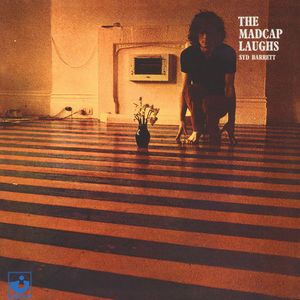

The Making of The Madcap Laughs (21st Anniversary ed.). Archived from the original on 17 June 2012. ^ Palacios, Julian (30 September 2009).Archived from the original on 4 March 2012. ^ "Syd Barrett: Lucy Leave & Other Rarities - All Pink Floyd Fan Network".David Gilmour – bass guitar, drums, co-producer.Syd Barrett – vocals, acoustic and electric guitars, producer.In 2011, as part of Record Store Day Black Friday, a limited edition tin-set featuring a replica of the "Octopus" single yellow vinyl, with a 120-page book of photos of Barrett by photographer, Mick Rock, was released in the US.


For later release in 2010, on An Introduction to Syd Barrett, David Gilmour added bass to one track, "Here I Go". It was included on the multi-artist Harvest compilation A Breath of Fresh Air – A Harvest Records Anthology 1969–1974 in 2007.

A very scarce exemplar of this single has been auctioned for 10,500 euros on 19 June 2016 (Lot 284) during an 8000 vinyl records sale organized by the "Discothèque de Radio France". In France, the single gained a picture sleeve, which had the drawing of an octopus on it. It was released on 14 November 1969, two months before the release of The Madcap Laughs. "Octopus" is known for being Barrett's only single as a solo artist. The album's title came about as a result of co-producer David Gilmour mishearing a line from this song ( "Well, the mad cat laughed at the man on the border." - although the word "madcap" does figure in another of the song's lyrics, "To a madcap galloping chase"). The 1993 re-releases of The Madcap Laughs and Opel contain alternate versions of "Octopus" and "Clowns and Jugglers" respectively, as bonus tracks. Īn early version of the song, recorded with the band Soft Machine, was released on the Barrett rarities album Opel (1988) under the title "Clowns and Jugglers". Barrett wanted to recover the Jenner-produced sessions recordings several tracks, including "Clowns and Jugglers", were improved upon. Īfter New Year 1969, a somewhat recovered Barrett decided upon returning to a musical career Barrett contacted EMI, and was passed on to Malcolm Jones, the then-head of EMI's new prog rock label, Harvest. Sessions stopped once Barrett was in psychiatric care, apparently after a drive around Britain in his Mini. During the May sessions, Jenner failed to record, properly, any vocals at all for several tracks, including "Clown and Jugglers". Jenner led Barrett into EMI Studios to record some tracks in May, that would later be released on Barrett's first solo album. Syd Barrett left Pink Floyd in April 1968, along with their manager Peter Jenner. The song also features a variety of other influences. "Octopus" directly quotes a section from "Rilloby-Rill" by English poet Sir Henry Newbolt (1862–1938). It's like a fool-proof combination of lyrics, really, and then the chorus comes in and changes the tempo but holds the whole thing together. The idea was like those number songs like Green Grow the Rushes, O where you have, say, twelve lines each related to the next and an overall theme. I carried that about in my head for about six months before I actually wrote it so maybe that's why it came out so well. In January 1970 it appeared on his first solo album The Madcap Laughs. " Octopus" (originally recorded as " Clowns and Jugglers" and also known as " The Madcap Laughs") is a song by Syd Barrett.


 0 kommentar(er)
0 kommentar(er)
